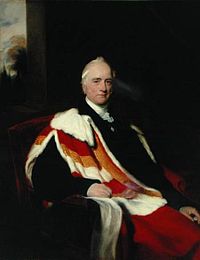24

Nathan Mayer Rothschild, the British branch of the Rothschild family business
19 January 1816, London
Nathan Mayer Rothschild shook Joseph’s hand firmly. “Welcome to N M Rothschild & Sons,” he said in precise German, as precise and measured as his English had been a few minutes before when speaking to another one of his wealthy clients, a nervous-looking fop who looked like he’d had to sell the family silverware to cover his gambling debts.
“Thank you,” Joseph replied, and settled down opposite one of the members of what would become the richest family in Europe. Nathan Rothschild settled down on the other side and folded his arms over his stomach. “May I ask,” Rothschild ventured, “what is the purpose of this visit?”
Joseph smiled. “I’ve been following your success quite closely, Herr Rothschild,” he remarked. Truthfully, he had only begun doing reading the previous year. “I met your brother- James Mayer- in Paris. A very astute financier, and of impeccable moral standards.” He’d met the Parisian Rothschild only in the barest sense of the word,” having recognized him fondling one of the Polish women at Milla’s bordello in passing.
“Thank you,” Rothschild smiled back, inflating slightly with pride.
“I just got this idea, you see. The Interior Minister- von Warthausen- he’s thinking of founding a bank. Do you think it would be all right if you, I suppose, asked your brother to help out?” Joseph’s face betrayed a carefully falsified expression of embarrassment. Rothschild laughed lightly.
“My brother will involve himself in any profitable enterprise, as will any other member of our family.” He leaned forward. “Please, allow me to make clear, Archduke. The Rothschilds have business in every corner of Europe- we are loyal to our own families, and to the states which we have made our own. Attempting to pressure or bribe us into serving Vienna alone is rather pointless. If Britain offers better profit- and it does- then we will serve Britain, as I am doing now. And so on, for Naples and France and Austria.”
Joseph deflated. “Oh,” he muttered. “Well, it was worth a shot.” He removed his pince-nez and rubbed his face; Rothschild watched him patiently and with not a little bit of amusement. “My father intends to ennoble your whole family; I’m talking to him to expedite the process. Until then, your family might want to know that they might be given the hereditary title of Freiherr soon enough… Baron von Rothschild.”
“Thank you,” Rothschild replied, inflating once more, his fingers drumming on the table.
“We’re also thinking of industrializing, and would appreciate investment. Imagine, if you will-” and here Joseph removed a little map from his pocket, an exquisite vista of Austria with little gold leafing, “-imagine Bohemia, fully industrialized on a similar scale to this great nation of Britain, supplying manufactured goods to Prussia and Saxony and Bavaria. Venice- the old home of the Serene Republic- a naval power again, building steamboats such as you see in the rivers of England, teaching aspiring naval officers the secrets of the sea. Lombardy- a textile and silk paradise, the richest province of the Empire, the cockpit of the peninsula. Temesvar has a reasonable source of coal. Transylvania is rich in iron, lead, gold and copper. Hungary is undergoing an agricultural revolution, exporting large amounts of grain and wool. It will be the breadbasket of the Balkans-”
Rothschild concealed a flash of excitement and smiled blandly, noting to himself that not once had Joseph mentioned the word “Italy”. “And what about the Hereditary Lands and Galicia?” he asked.
“I suppose Vienna can be the centre of finance,” Joseph said doubtfully, “and Galicia has- might have- oil, for whatever purpose it may be exploited. I expect uses can be found for it.” He leaned forward. “So. Investment?”
“If it is repaid, I suppose we can consider,” Rothschild replied, and shuffled the papers on his desk in a bid not to look at Joseph. His carefully organized mind was whirring, recalling old contacts in the railroad industry, and grizzled captains of the Royal Navy who owed him one or two favours. “Nothing is set in stone, of course; but your pitch was most convincing.”
“Mmm.”
Last edited:


